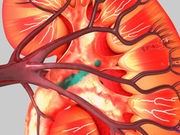

Even a slight decline in kidney function can lead to heart damage, a new study suggests.
“Mild chronic kidney disease is common, affecting over 10 percent of the U.S. population, so if kidney disease really is a cause of heart disease it may be a major public health problem,” said study senior author Dr. Jonathan Townend, a professor of cardiology at Queen Elizabeth Hospital Birmingham in England.
The study, published Jan. 11 in the journal Hypertension, included 68 living kidney donors, average age 47, who were followed for a year after donating their kidney. They were compared with a control group of 56 people, average age 44, who did not donate a kidney.
Compared to those in the control group, the kidney donors had an expected decrease in kidney function, an increase in the mass of the heart’s left ventricle (a strong predictor of heart disease risk), and a rise in heart damage markers in blood tests, the study found.
There was no difference in blood pressure between the two groups, according to the study.
“Even in very healthy people, a small reduction in kidney function from normal to just a bit below normal was associated with an increase in the mass of the left ventricle, a change that makes the heart stiffer and impairs its ability to contract,” Townend said in a journal news release.
It has long been known that kidney disease patients are at increased risk for heart disease. But many of them have other health problems such as high blood pressure and diabetes, making it difficult to assess the effect that declining kidney function has on the heart.
The kidney donors in this study had no chronic health conditions, making it possible to assess how a small reduction in kidney function affects the heart, the researchers explained.
“This is evidence that reduction in kidney function itself leads directly to measurable adverse effects on the heart and blood vessels, even without other risk factors. More research is needed to know just what aspects of reduced kidney function are responsible for the effects,” Townend said.
However, kidney donors should not be alarmed by these findings, he and his colleagues said.
“Kidney donors are already highly selected as healthy individuals. Our paper has shown that kidney donation causes very small adverse effects on the heart and blood vessels that took careful and accurate measurements to detect. We do not yet know if these effects are maintained over the long term,” Townend said.
Even if there is a small increase in your long-term risk of heart disease after donation, it is still likely that you will be at lower-than-average risk, he added.
More information
The U.S. National Kidney Disease Education Program explains how to keep your kidneys healthy.
Source: HealthDay
Copyright © 2024 HealthDay. All rights reserved.

Leave a Reply